2024 Kreisel Lecture with Kate Beaton
"Bodies of Art and Bodies of Labour"
On Thursday, March 7, 2024, Kate Beaton presented the 18th annual Kreisel Lecture, held at the TIMMS CENTRE for the ARTS. The lecture, titled "Bodies of Art and Bodies of Labour," was preceded by an introduction from Dr. Julie Rak, and was followed by a reception and book signing.
Watch the lecture on YouTube.
CBC Radio One's IDEAS with Nahlah Ayed aired a condensed version of the lecture on March 26, 2024, in an episode titled "What's lost when working-class voices are not heard." Listen to this episode on the CBC Listen website.
Lecture Abstract:
Class has always been a reality in Canada, but not a reality whose influence and power we have always acknowledged in the Canadian Arts scene. A working class person or a poor person is much less likely to become an artist than a middle class person or a wealthy person. They are less likely to be able to tell their own stories to a wider audience, and thus create the culture that we share—what becomes our national culture, the way we see ourselves, or the way we see each other. Yet, in demographic surveys of Arts, Publishing or Culture in Canada, you will rarely see economic background accounted for. In this and other ways, class remains an outlier. One thing is certain though—if working class and poor people do not write themselves into stories, other people certainly will.
I have been aware of class my entire life. Class has shaped my identity, my career, and my art. As I said in Ducks, the graphic novel you probably know my name by, we are from the have-not region of a have-not province, and it has not boomed here in decades. And so I want to talk about class and literature from my perch here in that region, the coasts of Cape Breton Island. Plenty has been written over the years, from writers up and down the class spectrum. Results vary.
Plenty of art has been made as well. My book dealt with some harrowing truths of working in isolated work camps in the oil sands. It was the reality of life. But I would not say it was the whole picture. I know I am here as a working artist today partly because I am the beneficiary of a community and a culture that has long valued art. Art for no money, for each other, for yourself, for memory, for community, for joy. That is a working class legacy as well, the value of my mind I learned from my community, even as I, like everyone else, shipped my body out for labour to the oil sands.
This lecture will be published in early 2025 by the University of Alberta Press, with the title Bodies of Art, Bodies of Labour.
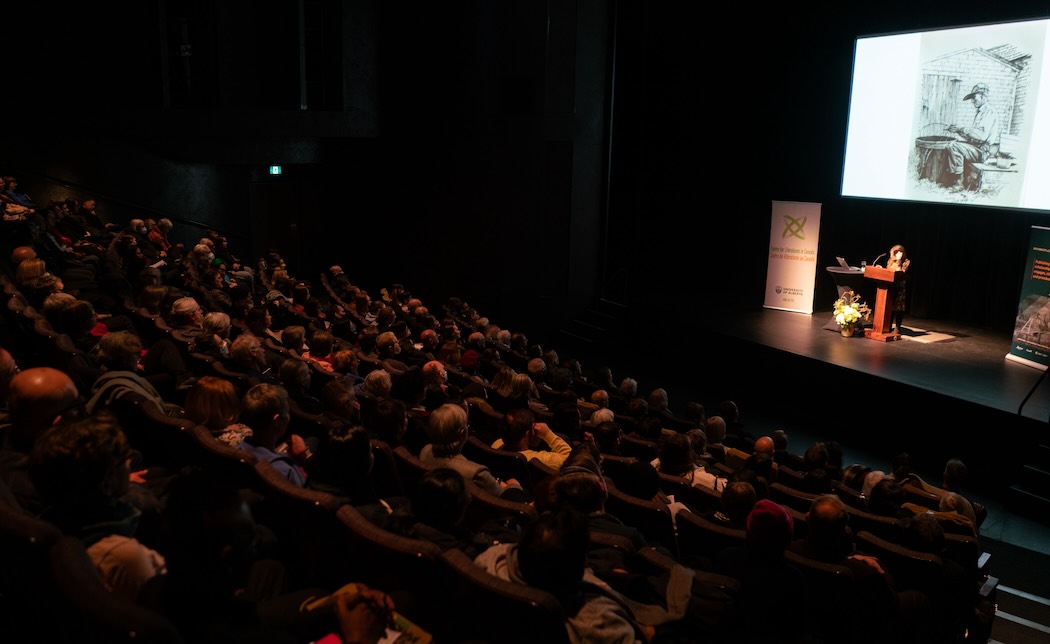
Kate Beaton presenting her lecture to a full audience at the TIMMS CENTRE for the ARTS.
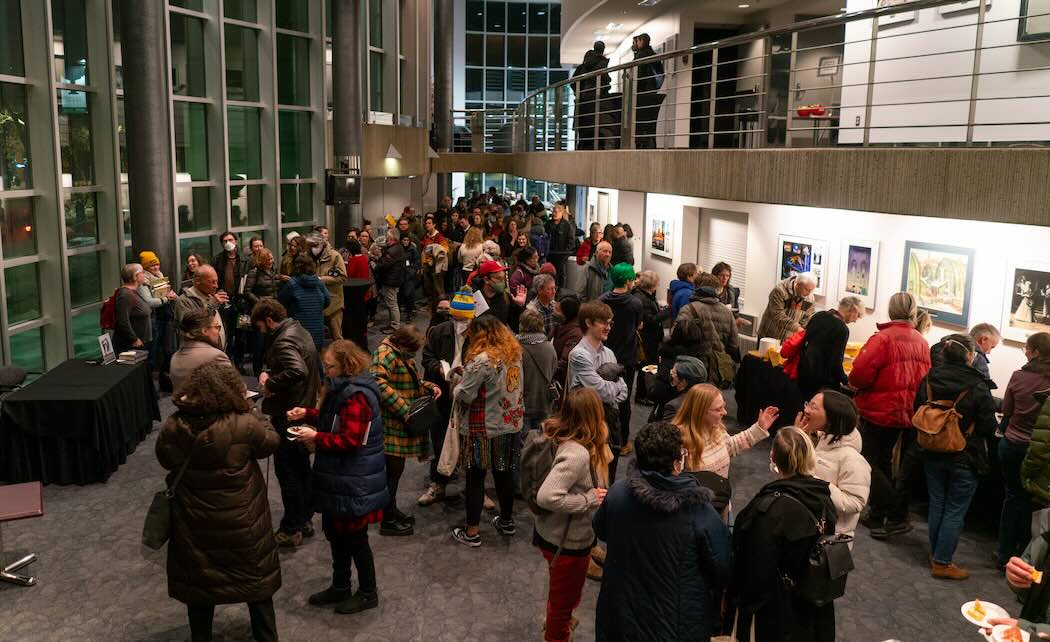
Attendees enjoying the post-lecture reception. Photos credit: Adrien Guyot
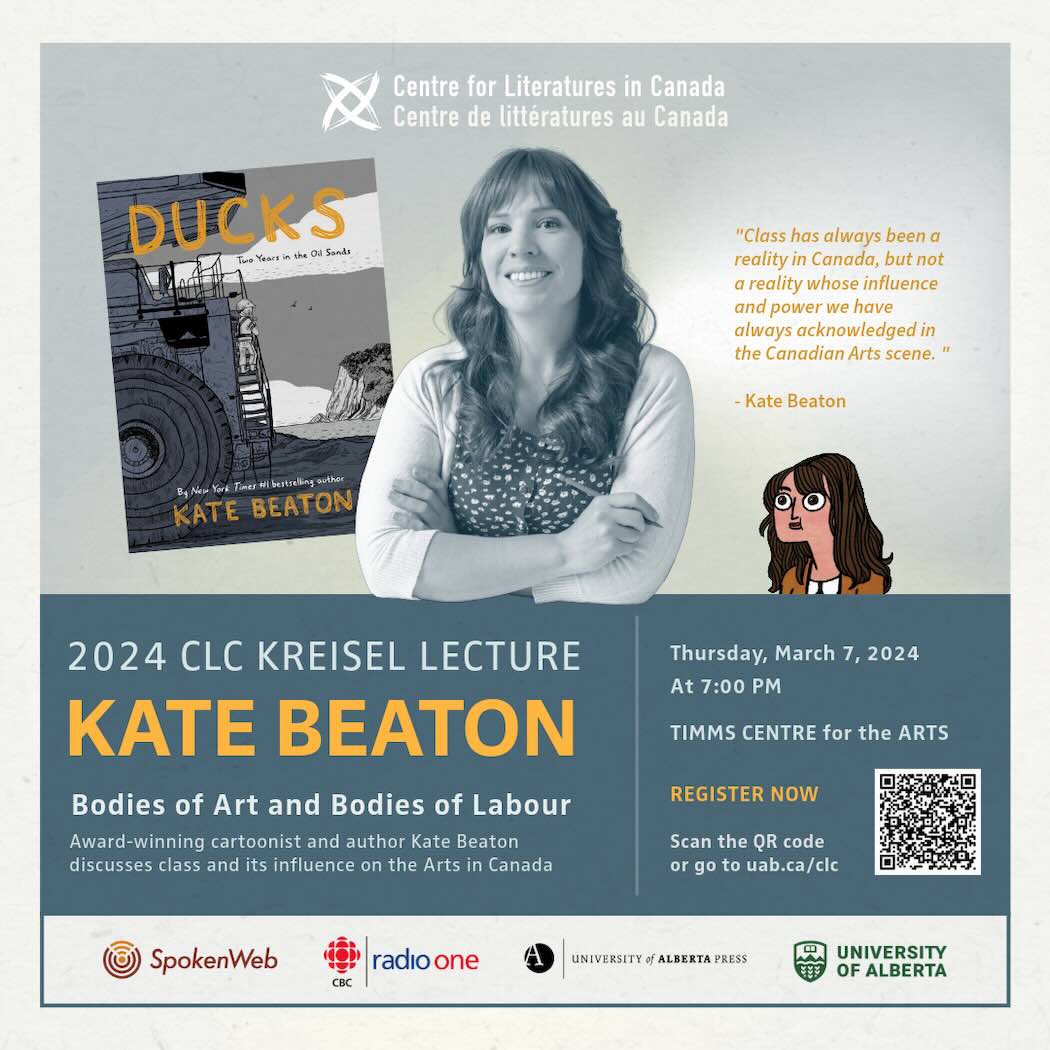
Portrait photo credit: Corey Katz
Author biography that was included in the event program:
Kate Beaton is a cartoonist and graphic novelist from Nova Scotia. While studying history at Mount Allison University in New Brunswick, Beaton began writing comics for the student newspaper. Her comics, which combined literature, history, and off-beat humour, became immensely popular online, leading to the publication of two acclaimed comic volumes: Hark! A Vagrant (2011) and Step Aside, Pops! (2015), as well as children’s picture books The Princess and the Pony (2015) and King Baby (2016). Beaton’s first graphic memoir, Ducks: Two Years in the Oil Sands, received wide acclaim upon publication in 2022. In addition to being the first graphic narrative to win Canada Reads (2023), Ducks received the Eisner Award for Best Graphic Memoir and praise from Quill & Quire, Canadian Parks and Wilderness Society, and President Barack Obama. Kate Beaton currently resides in Nova Scotia with her husband and two children.
2023 Kreisel Lecture with Wayde Compton
"Toward an Anti-Racist Poetics"
On Wednesday, March 8, 2023, Wayde Compton presented the 17th annual Kreisel Lecture, held at the TIMMS CENTRE for the ARTS. The lecture, titled "Toward an Anti-Racist Poetics," was preceded by an introduction from Dr. Michael Bucknor, and was followed by a Q & A, reception, and book signing.
Watch the lecture and Q & A on YouTube.
Lecture Abstract:
In his lecture, Wayde Compton explores how we might collectively develop a poetic approach that makes space for diversity by doing away with universalism in both lyric and avant-garde verse. The lecture probes Canada's myths about race and multiculturalism and expands how we think about the role writers play in creating anti-racist imaginaries.
This lecture was published with the title Toward an Anti-Racist Poetics.
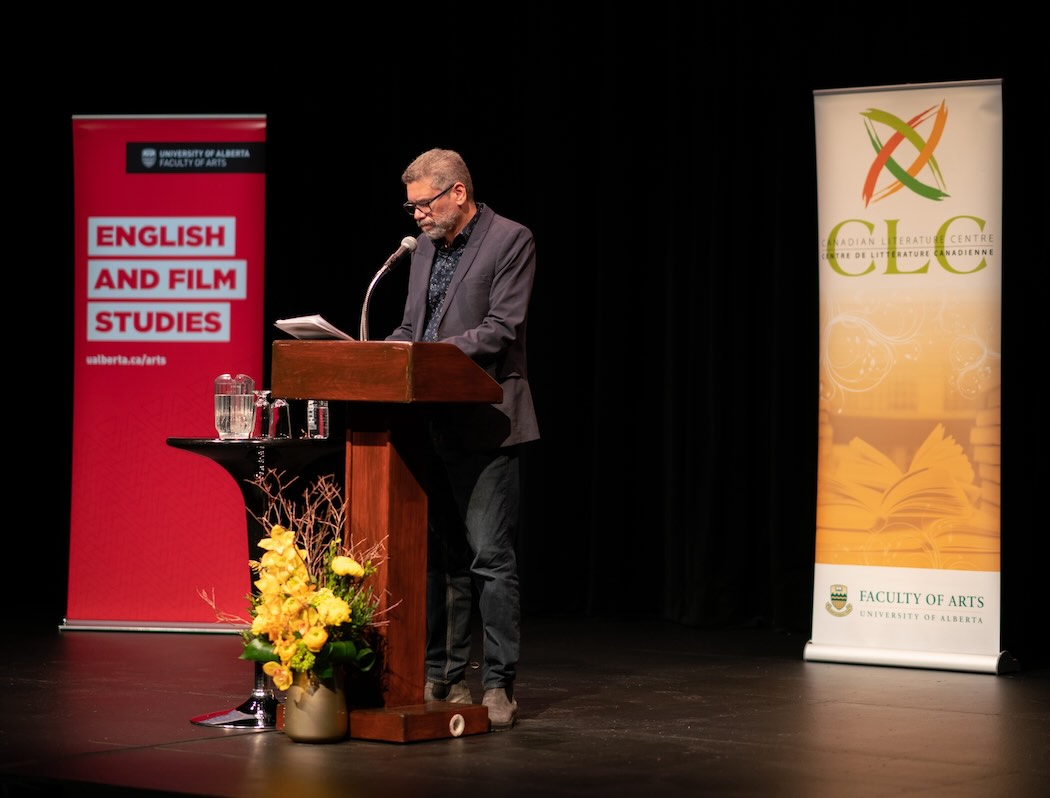
Wayde Compton delivering the 17th annual Kreisel Lecture.
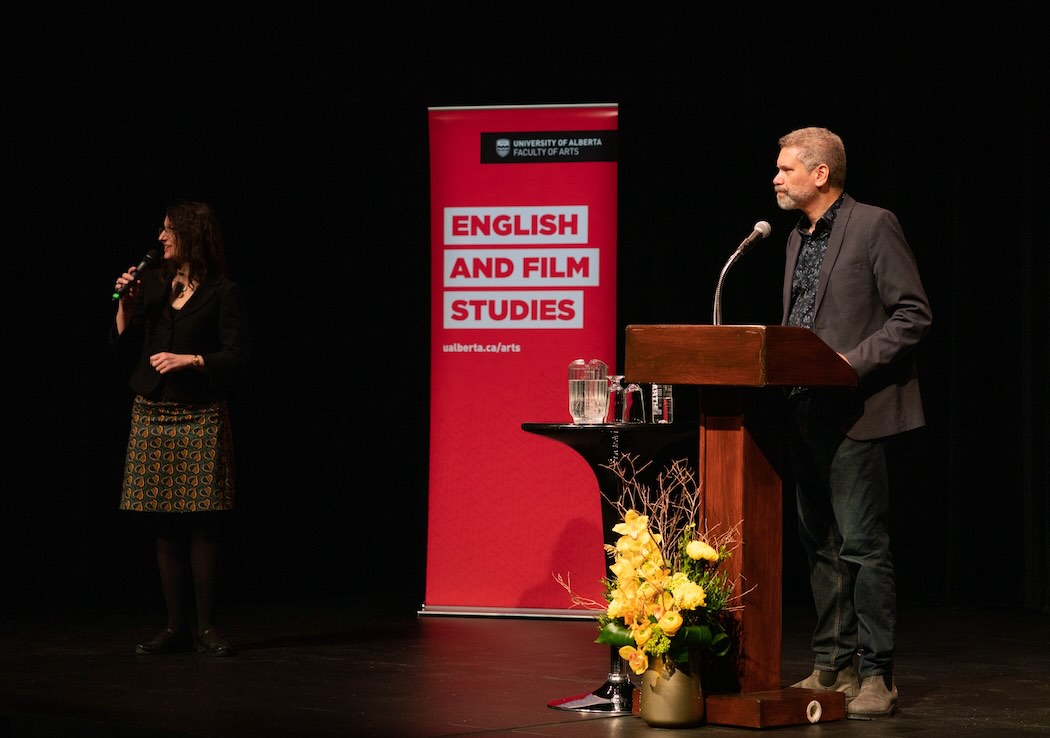
CLC Acting Director, Dr. Kristine Smitka, and Wayde fielding questions from the audience. Photos credit: Adrien Guyot
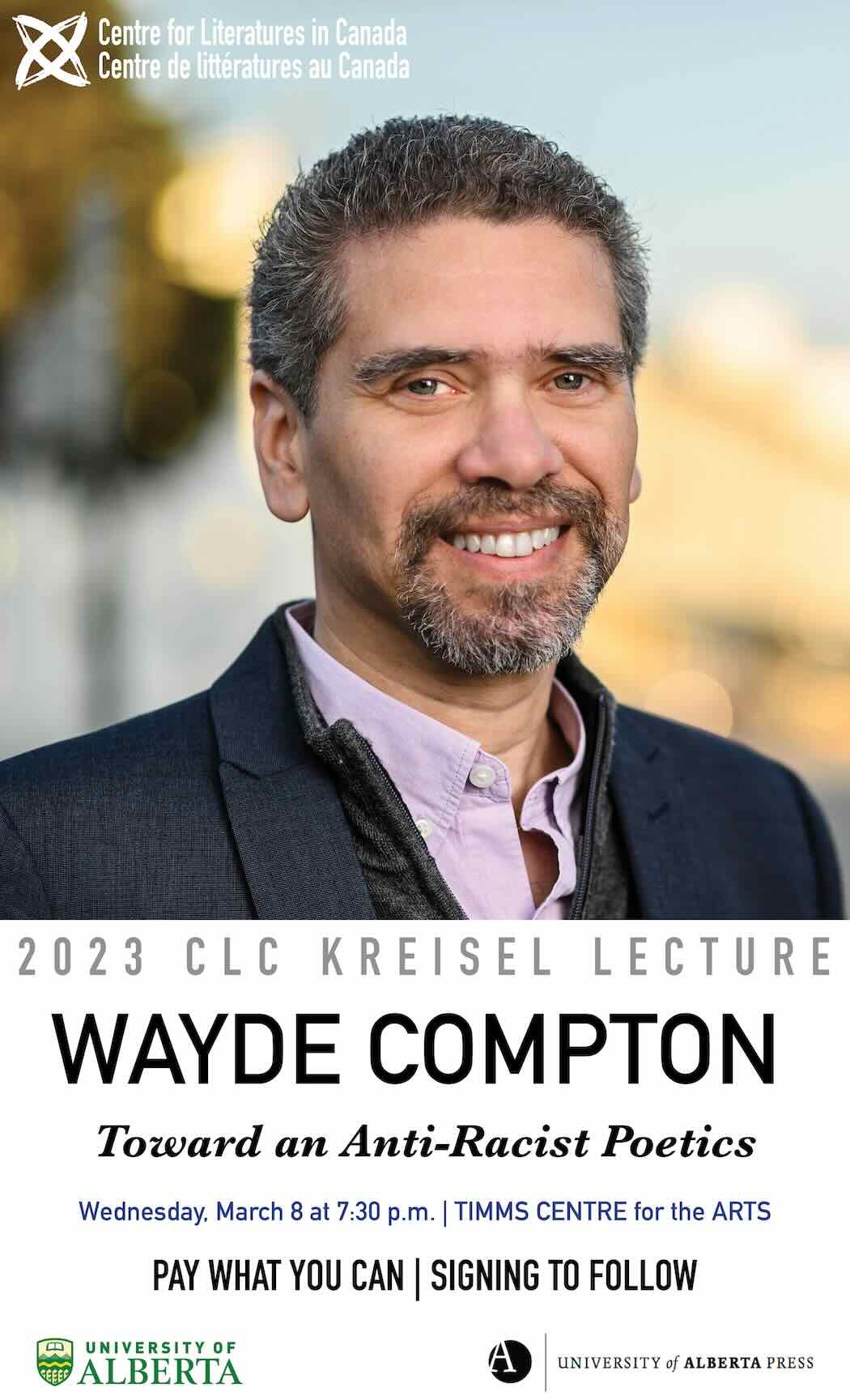
Portrait photo credit: Roger Hur
Author biography that was included in the event program:
Wayde Compton has written five books and has edited two literary anthologies. His collection of short stories, The Outer Harbour, won the City of Vancouver Book Award in 2015, and he won a National Magazine Award for Fiction in 2011. His work has been a finalist for two other City of Vancouver Book Awards as well as the Dorothy Livesay Poetry Prize. In 2006 Compton co-founded Commodore Books, western Canada’s first Black Canadian literary press. Compton has been writer-in-residence at Simon Fraser University (SFU), Green College at the University of British Columbia, and the Vancouver Public Library. From 2012-18, he administrated the Creative Writing Program in Continuing Studies at SFU, including the award-winning Writer’s Studio. He is currently working on a re-imagining of The Argonautika by Apollonius of Rhodes as a surrealist slave narrative set on the west coast of North America in the 18th century. Compton is currently the chair of Creative Writing at Douglas College in New Westminster, BC.
2022 Kreisel Lecture with Cherie Dimaline
"An Anthology of Monsters: How Story Saves Us from Our Anxiety"
Cherie Dimaline presented the 16th annual Kreisel Lecture, titled "An Anthology of Monsters: How Story Saves Us from Our Anxiety," on Thursday, April 21, 2022, at the TIMMS CENTRE for the ARTS. Writer and performer Anna Marie Sewell introduced Cherie, and the lecture was followed by a reception and book signing.
Watch the lecture on YouTube.
Lecture Abstract:
Told from the viewpoint of someone with life-long anxiety (who also happens to be an author), this lecture focuses on the stories we tell ourselves—both the very excellent and the very horrible.
The Rougarou as both belonging and responsibility, witches as empowerment and fear—using examples like these from her own published and forthcoming work, Cherie Dimaline examines the ways in which we empower, crush, survive, and succeed all through stories. We also hear about ways to collect and curate these stories so that we don’t end up buried in an ‘edit reel’.
Basically, this is the tale of an intricate dance with anxiety and how story can help reshape the ways in which we think, the ways we cope, and the very choreography of that dance. And yes, this is largely biographical.
This lecture was published with the title An Anthology of Monsters: How Story Saves Us from Our Anxiety.
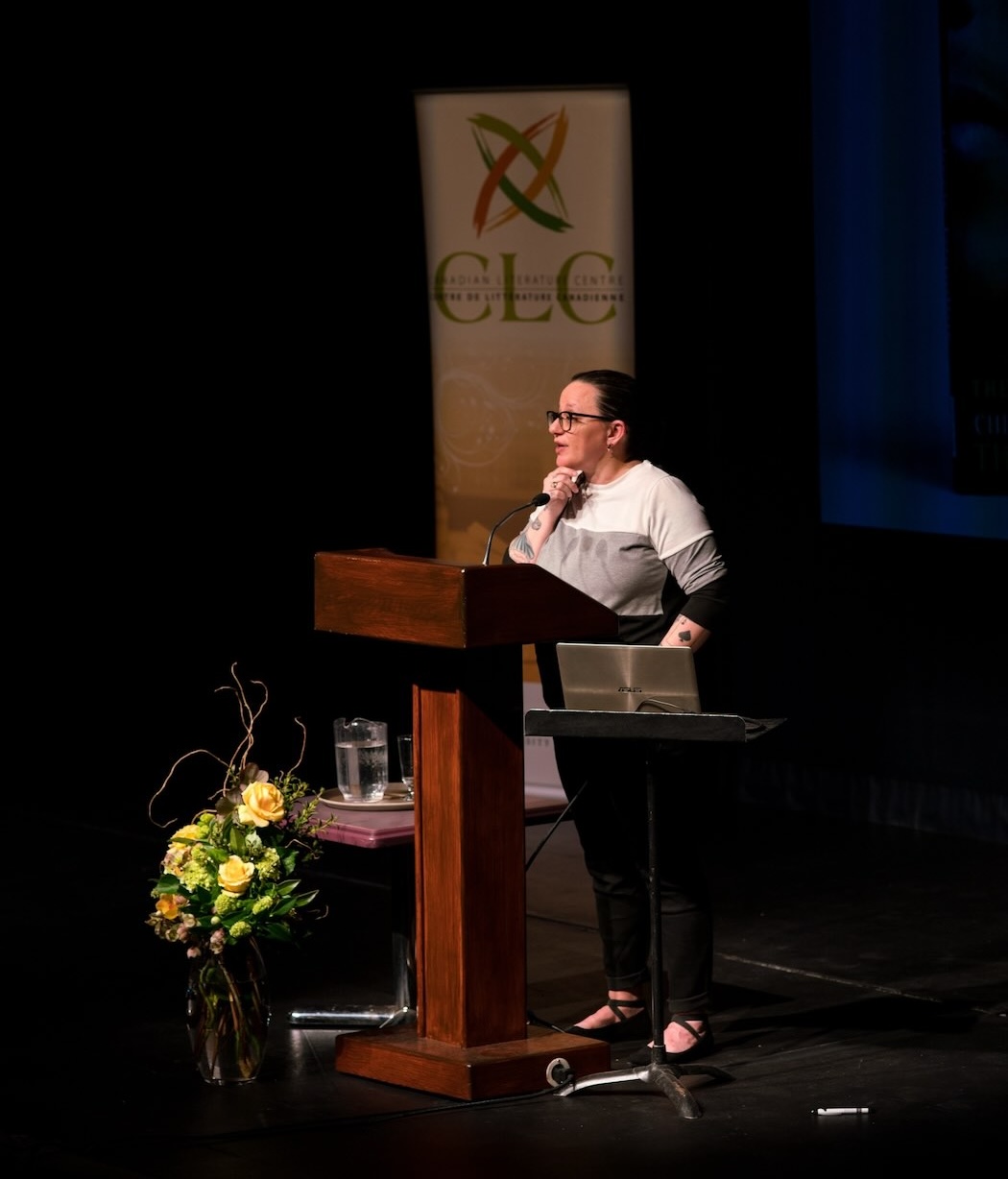
Cherie Dimaline presenting her lecture.
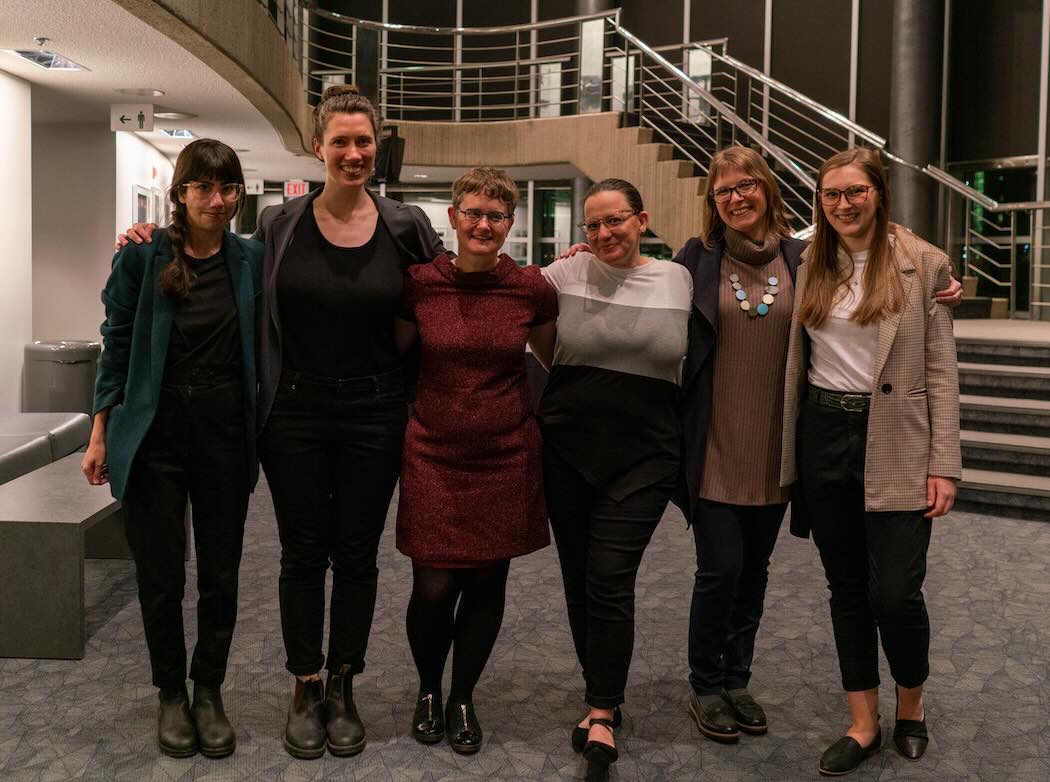
The CLC team with Cherie at the reception (from L to R: Yaghma Kaby, Megan Gannett, Danielle Fuller, Cherie Dimaline, Sarah Krotz, Austen Lee). Photos credit: Adrien Guyot
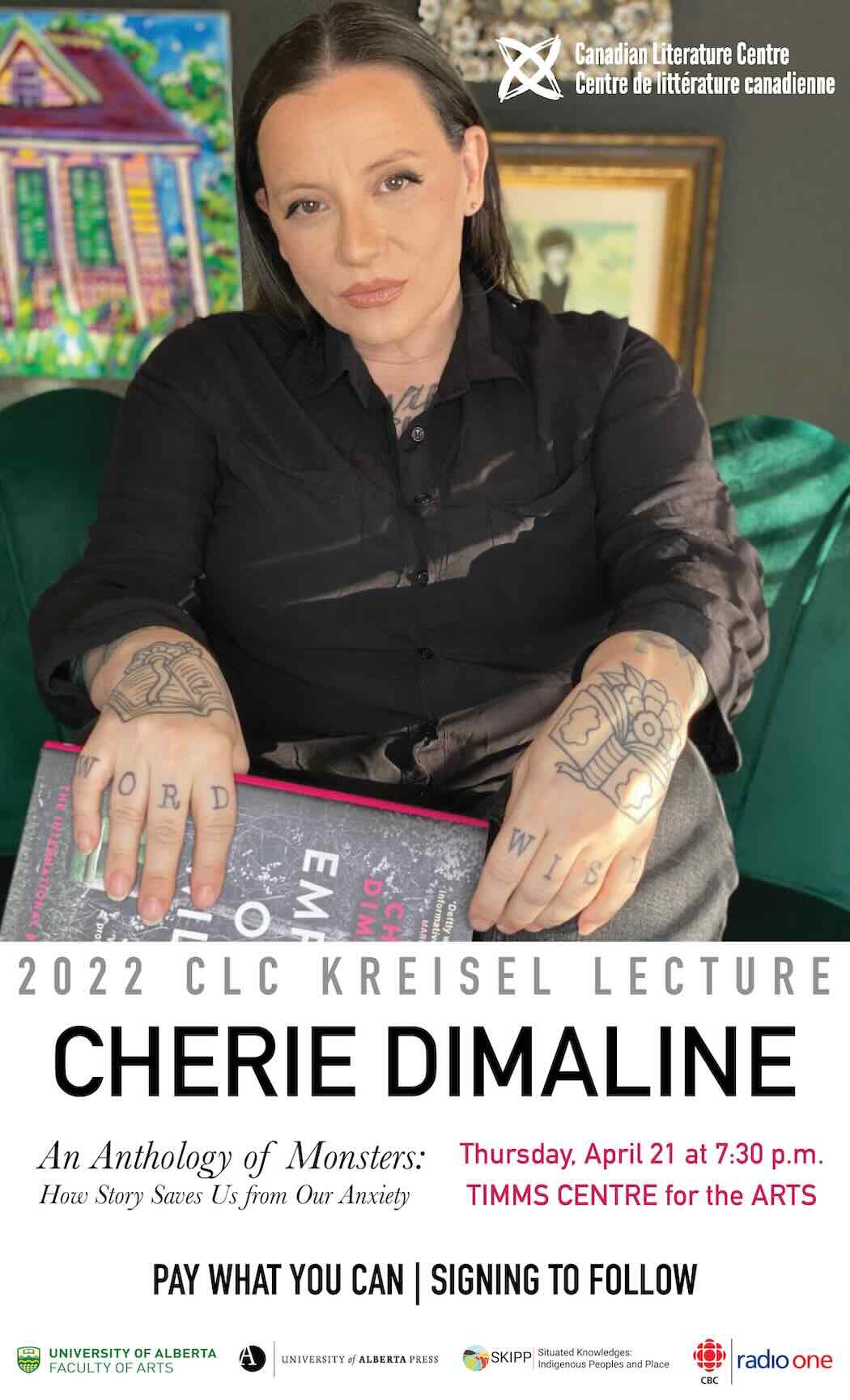
Portrait photo credit: Wenzdae Brewster
Author biography that was included in the event program:
Cherie Dimaline’s The Marrow Thieves shot to the top of the bestseller lists when it was published in 2017, and has stayed there. It won the Burt Award for First Nations, Métis, and Inuit Literature, the Governor General’s Literary Award, the Kirkus Prize in Young Readers’ Literature, was a finalist for the Trillium Book Award, and was a fan favourite in CBC’s Canada Reads (2018). It was also a Book of the Year on numerous lists including National Public Radio, the School Library Journal, the New York Public Library, Globe and Mail, Quill & Quire, and the CBC. Pressure from her young fans spurred Dimaline to write Hunting by Stars, the 2021 sequel to The Marrow Thieves. This new novel has been described as “lush, devastating, and hope-filled” (Kirkus Reviews). Dimaline’s adult novel, Empire of Wild, was an Indigo #1 Best Book of 2019. From the Georgian Bay Métis Community, she lives in Midland, Ontario.
2021 Kreisel Lecture with Vivek Shraya
"Next Time There's a Pandemic"
Due to the ongoing COVID pandemic, the CLC hosted the 15th annual Kreisel Lecture via Zoom. This virtual event featuring Vivek Shraya took place on Monday, March 29, 2021, and began with an introduction from Dr. Sarah Krotz, the CLC's Director, and a conversation between Vivek and author J.R. Carpenter, who was the University of Alberta's Writer-in-Residence that year. Vivek then presented her lecture "Next Time There's a Pandemic" as a pre-recorded talk and musical performance, which was followed by a live Q & A with the remote audience.
Watch the full lecture with conversation and Q & A, or just the lecture, on YouTube.
CBC Radio One's The Next Chapter aired Vivek Shraya in conversation with Shelagh Rogers about the publication of Next Time There's a Pandemic. Listen to and read excerpts from this episode from May 20, 2022, on the CBC Radio website.
CBC Radio's The Homestretch also interviewed Vivek Shraya, which you can read on their website: "'Did I do the pandemic wrong?' Calgary writer's new book reflects on COVID-19 and ongoing healing"
Lecture Abstract:
Vivek Shraya's lecture reflects on how she might have approached 2020 and the COVID-19 pandemic differently, and what she wishes we collectively might have done differently.
View the event program.
This lecture was published with the title Next Time There's a Pandemic.
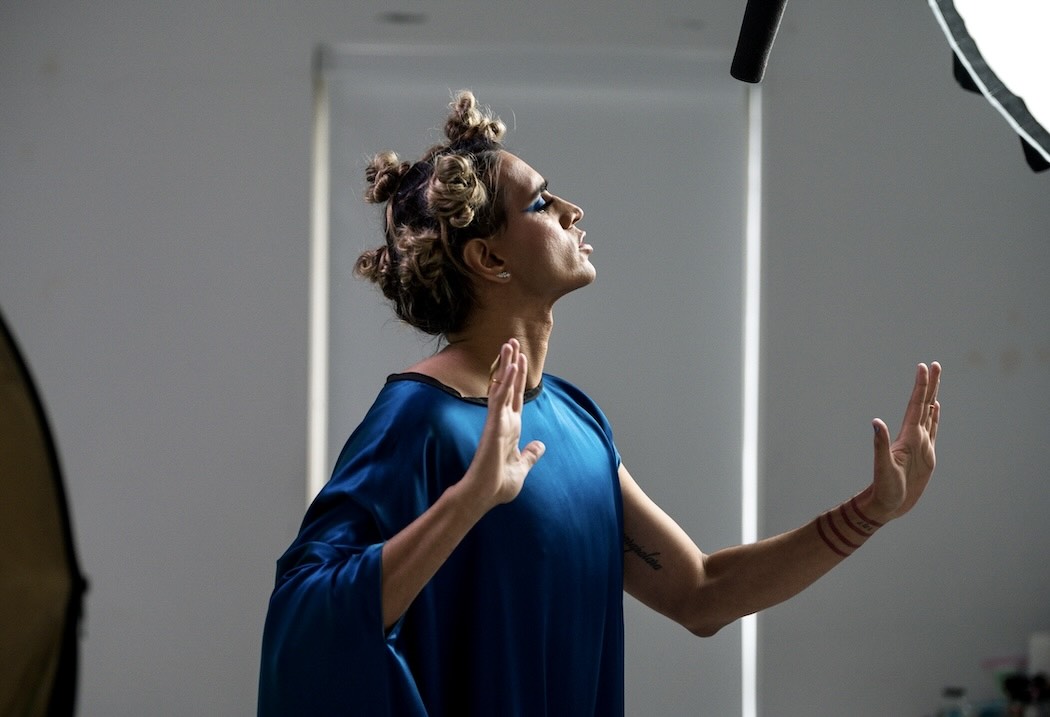
Behind the scenes photos of Vivek Shraya recording the 2021 Kreisel Lecture.
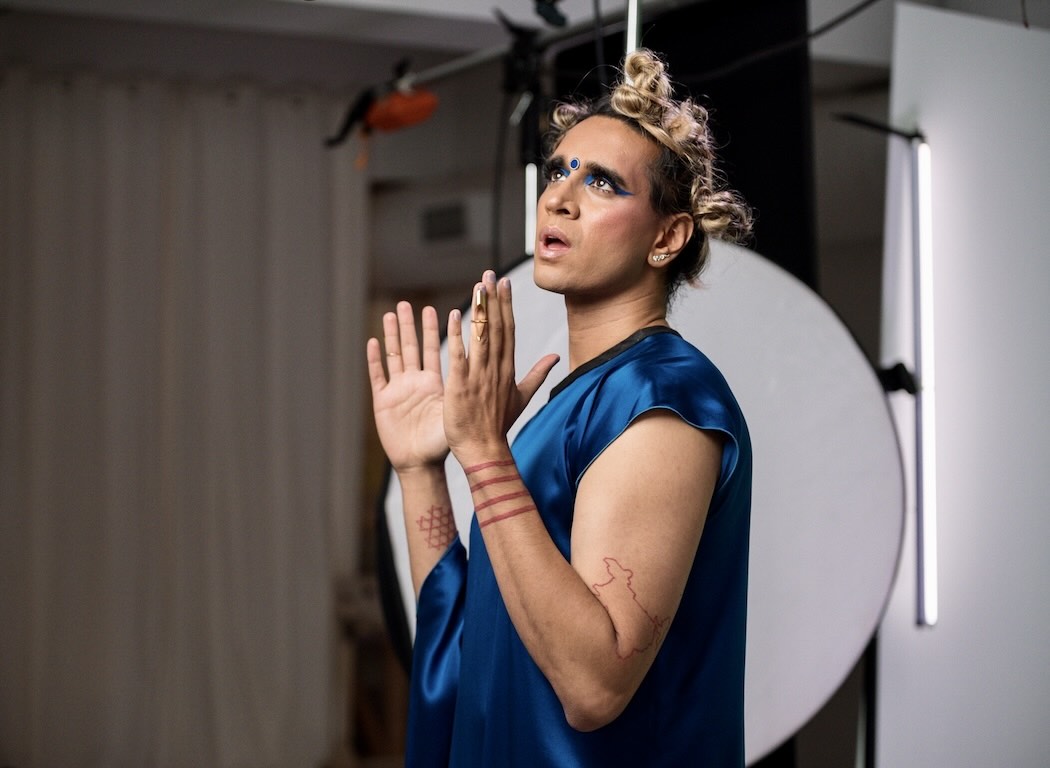
Photos credit: Alejandro Santiago
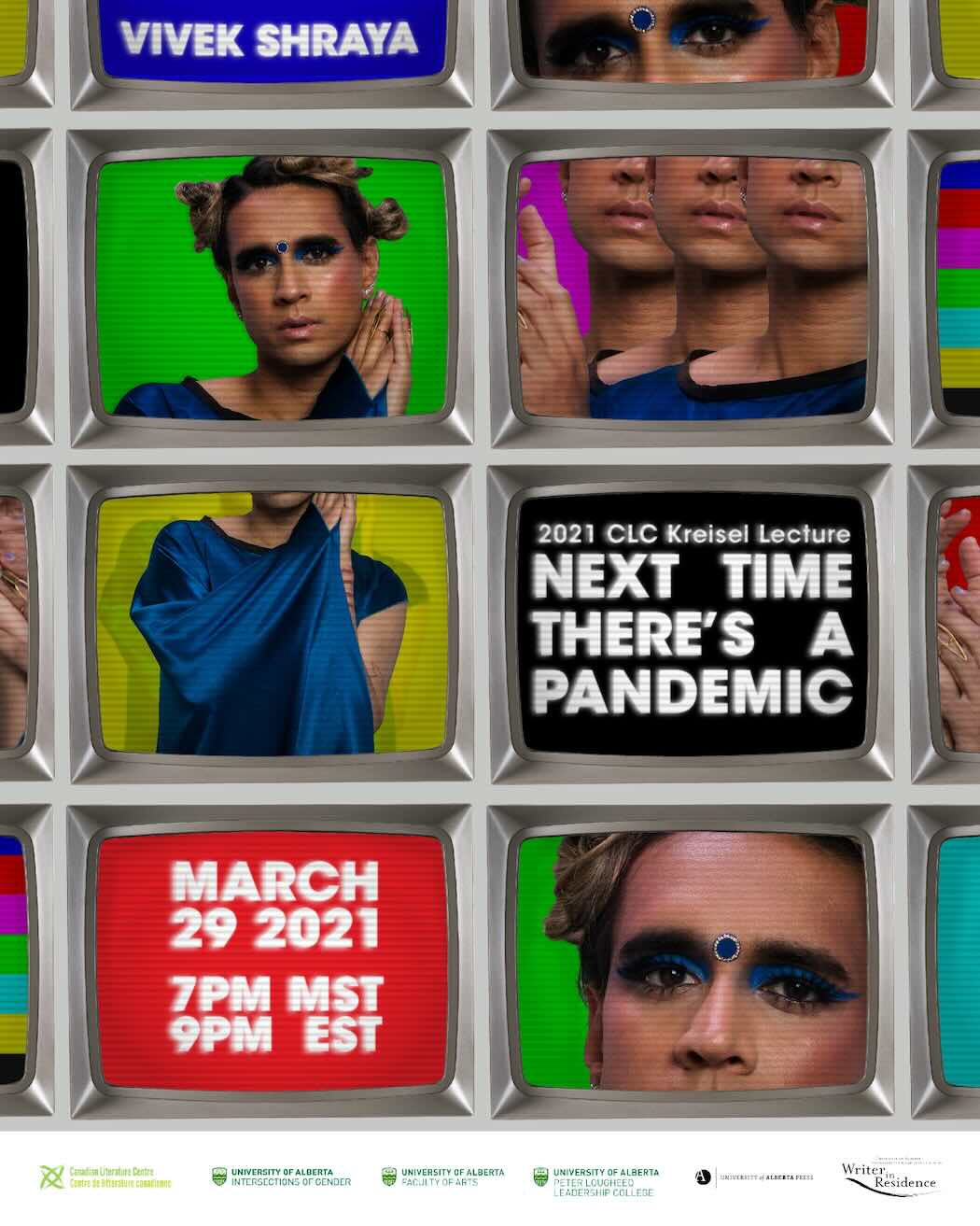
Author biography that was included in the event program:
Vivek Shraya is an artist whose body of work crosses the boundaries of music, literature, visual art, theatre, and film. Her best-selling book I’m Afraid of Men was heralded by Vanity Fair as “cultural rocket fuel,” and her album with Queer Songbook Orchestra, Part‑Time Woman, was nominated for the Polaris Music Prize. She is also the founder of the publishing imprint VS. Books.
A seven-time Lambda Literary Award finalist, Vivek was a Pride Toronto Grand Marshal and has featured on The Globe and Mail’s Best Dressed list. She is a director on the board of the Tegan and Sara Foundation, an Assistant Professor of Creative Writing at the University of Calgary, and is currently adapting her debut play, How To Fail As A Popstar, into a television pilot script with the support of the CBC.
2020 Kreisel Lecture with Leanne Betasamosake Simpson
"A Short History of the Blockade: Giant Beavers, Diplomacy & Regeneration in Nishnaabewin"
On Thursday, March 12, 2020, Leanne Betasamosake Simpson presented the 14th annual Kreisel Lecture, held at the TIMMS CENTRE for the ARTS. The lecture, titled "A Short History of the Blockade: Giant Beavers, Diplomacy & Regeneration in Nishnaabewin," was preceded by an introduction from Dr. Jordan Abel, and was followed by a Q & A, reception, and book signing.
Watch the lecture and Q & A on YouTube.
CBC Radio One's IDEAS aired a version of the lecture on April 16, 2020, in an episode titled "The Brilliance of the Beaver: Learning from an Anishnaabe World." Read excerpts from this episode on their website.
Lecture Abstract:
This lecture uses Michi Saagiig Nishnaabeg stories, storytelling aesthetics and practices to explore the generative nature of Indigenous blockades through our relative, the beaver or in Nishnaabemowin, amik. Moving through genres, shifting through time, amikwag stories become a lens for the life-giving possibilities of dams and the world-building possibilities of blockades, deepening our understanding of Indigenous resistance, as a negation and an affirmation.
This lecture was published with the title A Short History of the Blockade: Giant Beavers, Diplomacy and Regeneration in Nishnaabewin.
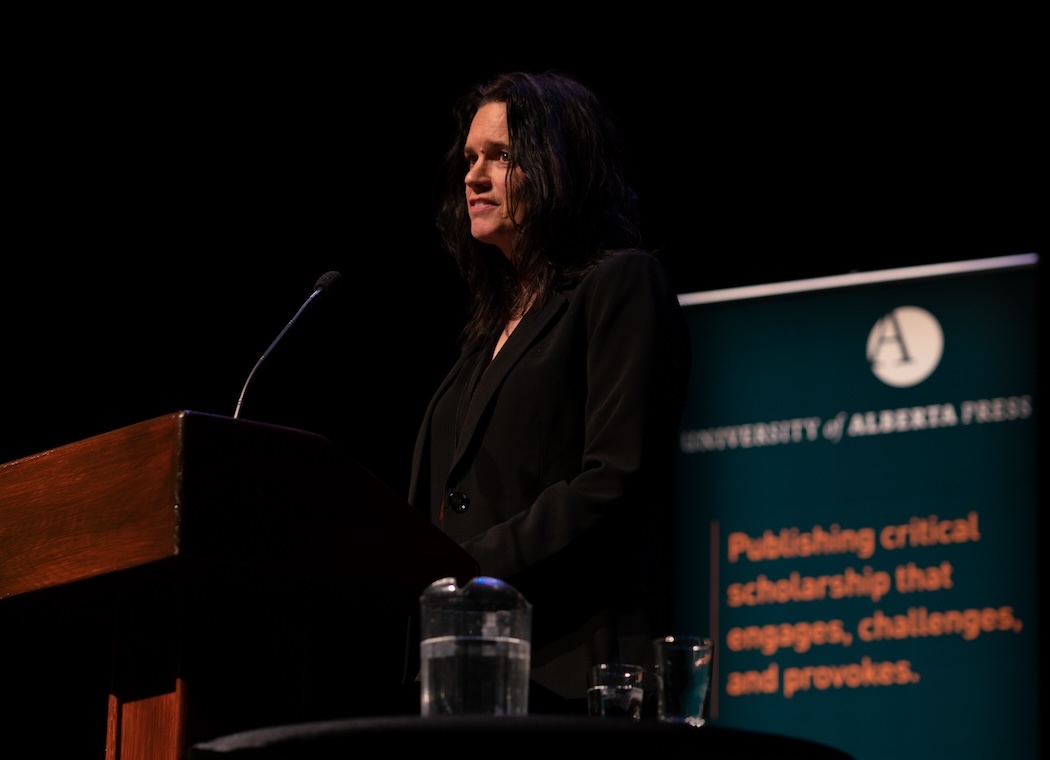
Leanne Betasamosake Simpson presenting her lecture. Photos credit: Adrien Guyot
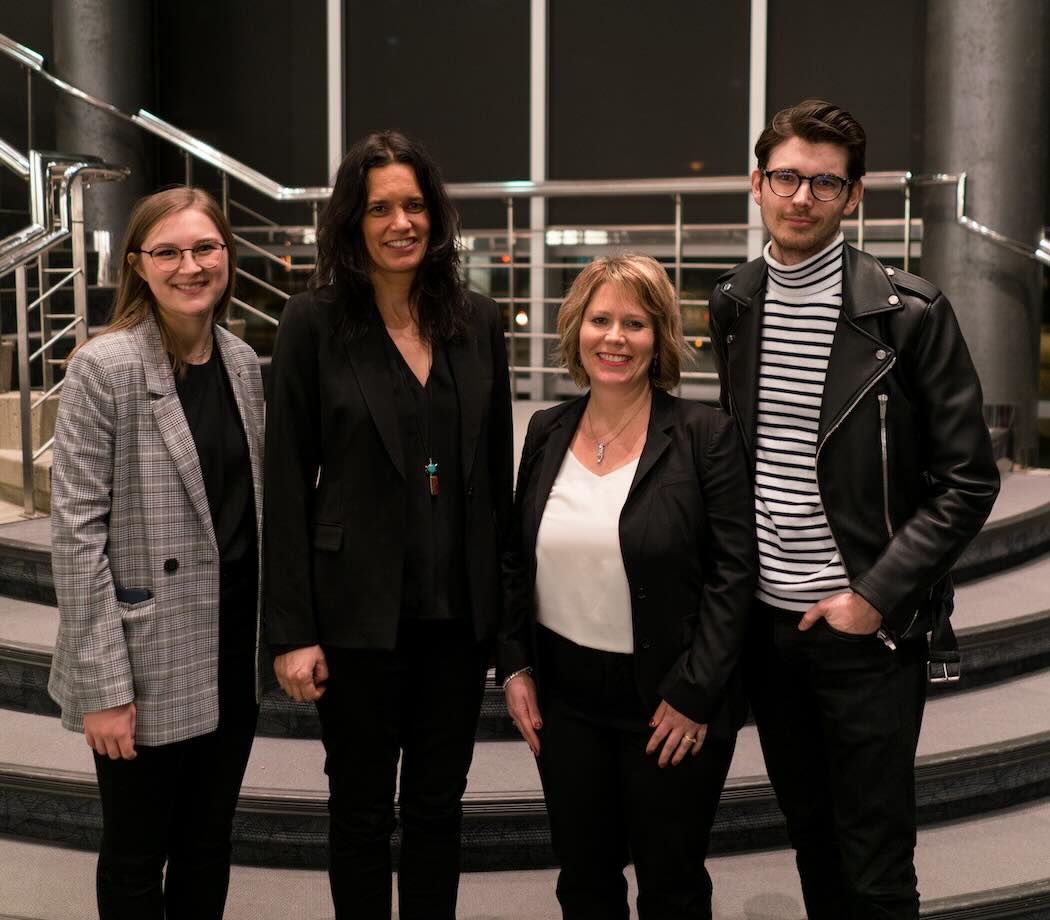
The CLC team with Leanne at the reception (from L to R: Austen Lee, Leanne Simpson, Marie Carrière, Jason Purcell).
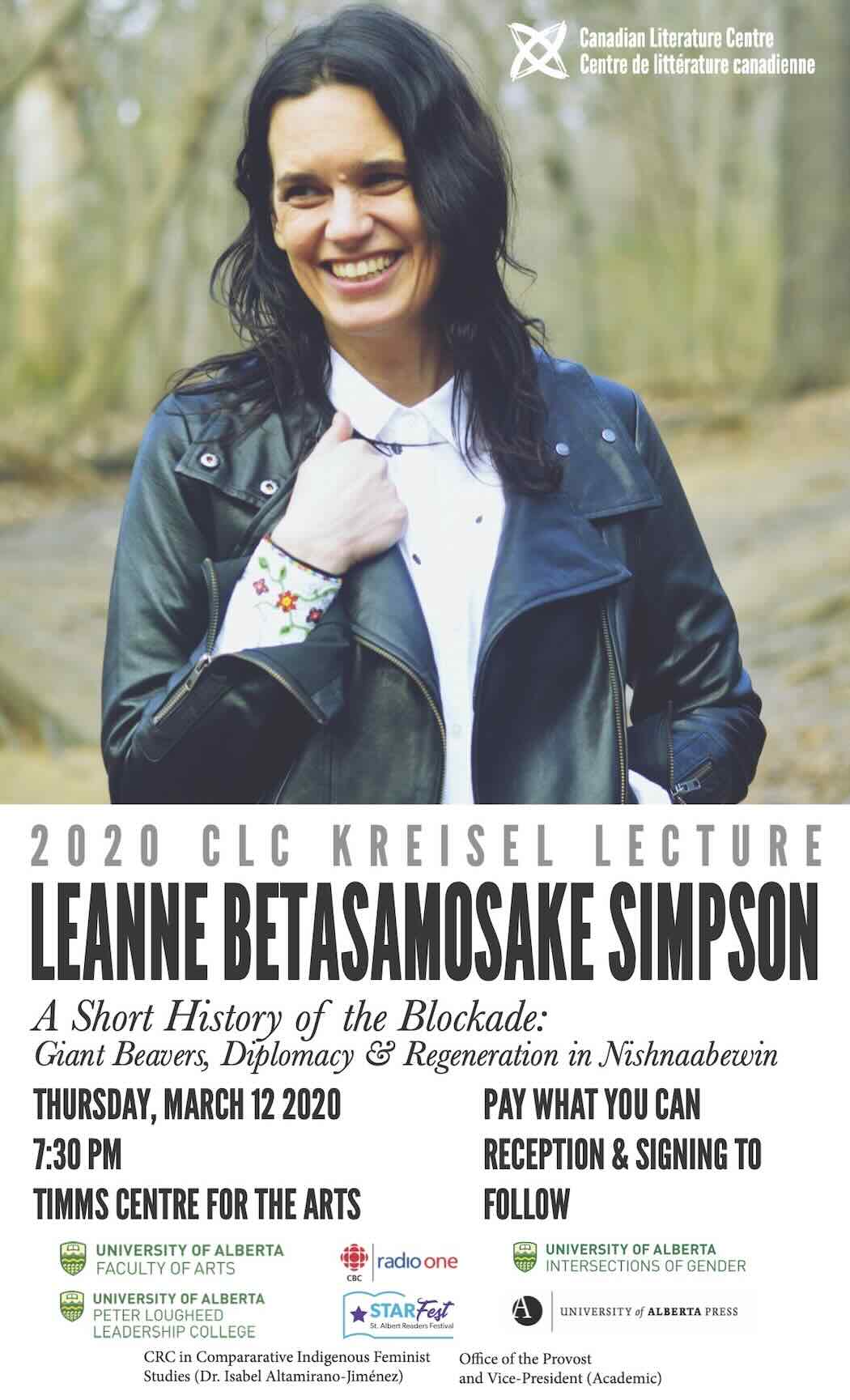
Author biography that was included in the event program:
Leanne Betasamosake Simpson is a renowned Michi Saagiig Nishnaabeg scholar, writer and artist who has been widely recognized as one of the most compelling Indigenous voices of her generation. Her work breaks open the intersections between politics, story, and song, bringing audiences into a rich and layered world of sound, light, and sovereign creativity.
Working for over a decade as an independent scholar using Nishnaabeg intellectual practices, Leanne has lectured and taught extensively at universities across Canada and has twenty years of experience with Indigenous land-based education. She holds a PhD from the University of Manitoba, and teaches at the Dechinta Centre for Research & Learning in Denendeh. Her latest book, As We Have Always Done: Indigenous Freedom Through Radical Resistance was published by the University of Minnesota Press in the fall of 2017, and was awarded Best Subsequent Book by the Native American and Indigenous Studies Association.
Leanne was named the inaugural RBC Charles Taylor Emerging writer by Thomas King in 2014 and in 2017/18 she was a finalist in the Rogers Writers’ Trust Fiction Prize and the Trillium Book Award. She has published extensive fiction and poetry in both book and magazine form. Her second book of short stories and poetry, This Accident of Being Lost is a follow-up to the acclaimed Islands of Decolonial Love.
2019 Kreisel Lecture with Dionne Brand
"An Autobiography of the Autobiography of Reading"
Dionne Brand presented the 13th annual Kreisel Lecture, titled "An Autobiography of the Autobiography of Reading," on Tuesday, April 16, 2019, at the TIMMS CENTRE for the ARTS. Author Lawrence Hill introduced Dionne, and the lecture was followed by a reception and book signing.
Watch the lecture on YouTube.
Lecture Abstract:
Narrative is, to my mind, implicated in the colonial/imperialist/racist project. With best efforts, one writes back to, or against, first the existence and then the persistence of the dominant narratives of coloniality, racism and imperialism. Coloniality is a fundamental category here. The Black person in narrative is always spectacular, always spectacularised, always marked. Our bodies are always active, always enacting in the register of this colonial narrative, or in the register of what I call in Land to Light On, “the hard gossip of race that inhabits this road.” So predicative, this narrative language demands, compels us, writers, to respond in the same language, struck through, enlivened by the action of our bodies in race. “An Autobiography of the Autobiography of Reading” makes an account of what I read (especially early bibliographies), how those readings read and positioned Black being; how they worked on ‘self,’ on language, on appearance. Finally, by taking up Black poetics, “An Autobiography of the Autobiography of Reading” suggests a remedy for narrative.
This lecture was published with the title An Autobiography of the Autobiography of Reading.
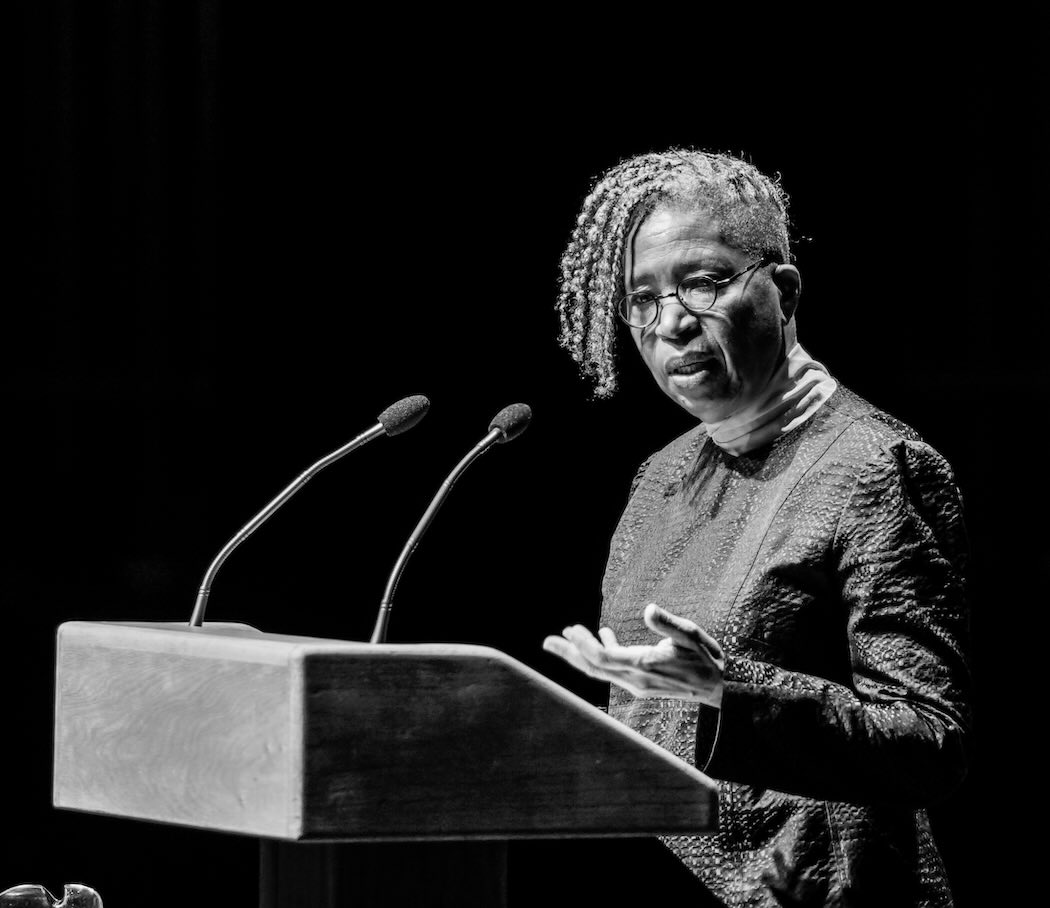
Dionne Brand presenting the 13th annual Kreisel Lecture. Photos credit: Adrien Guyot
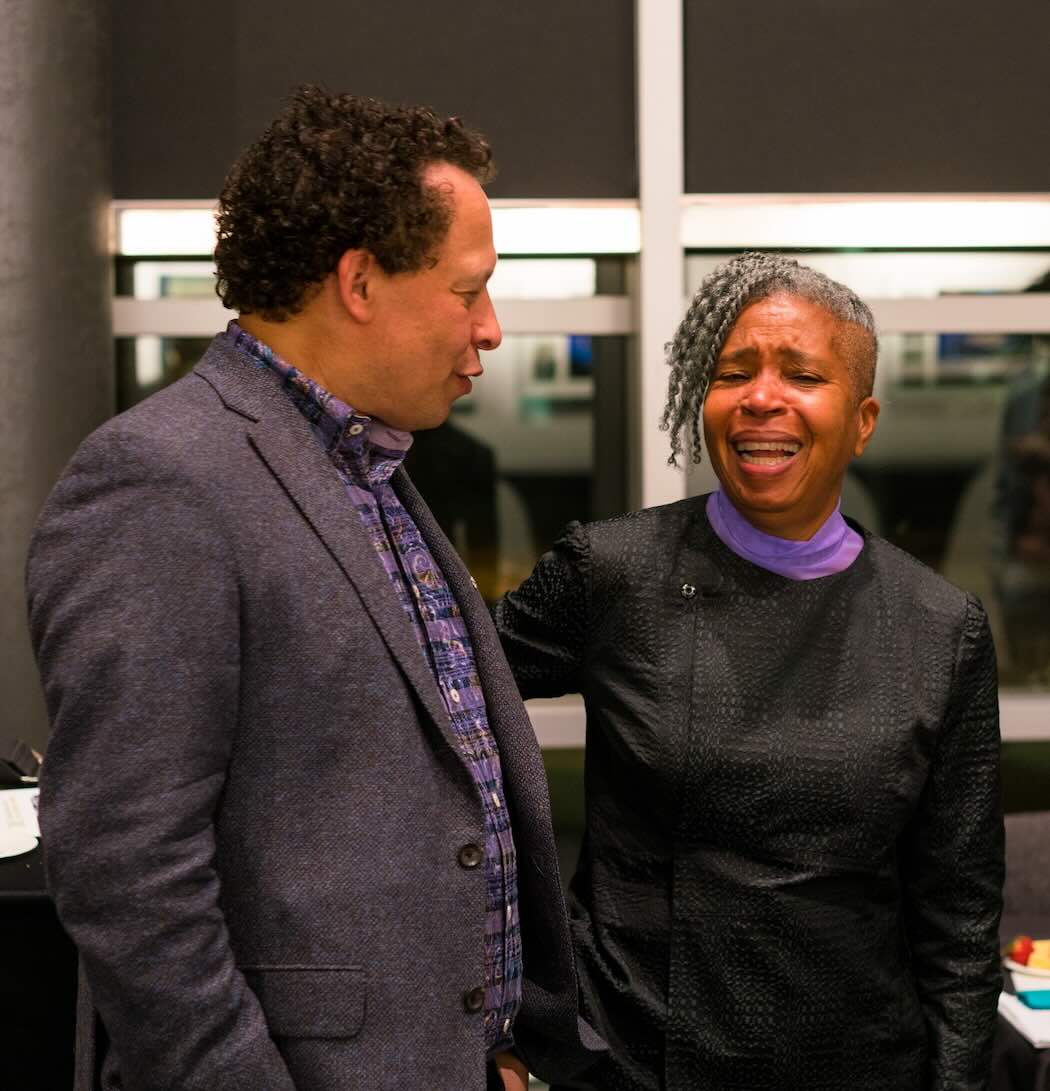
Lawrence Hill with Dionne at the reception.
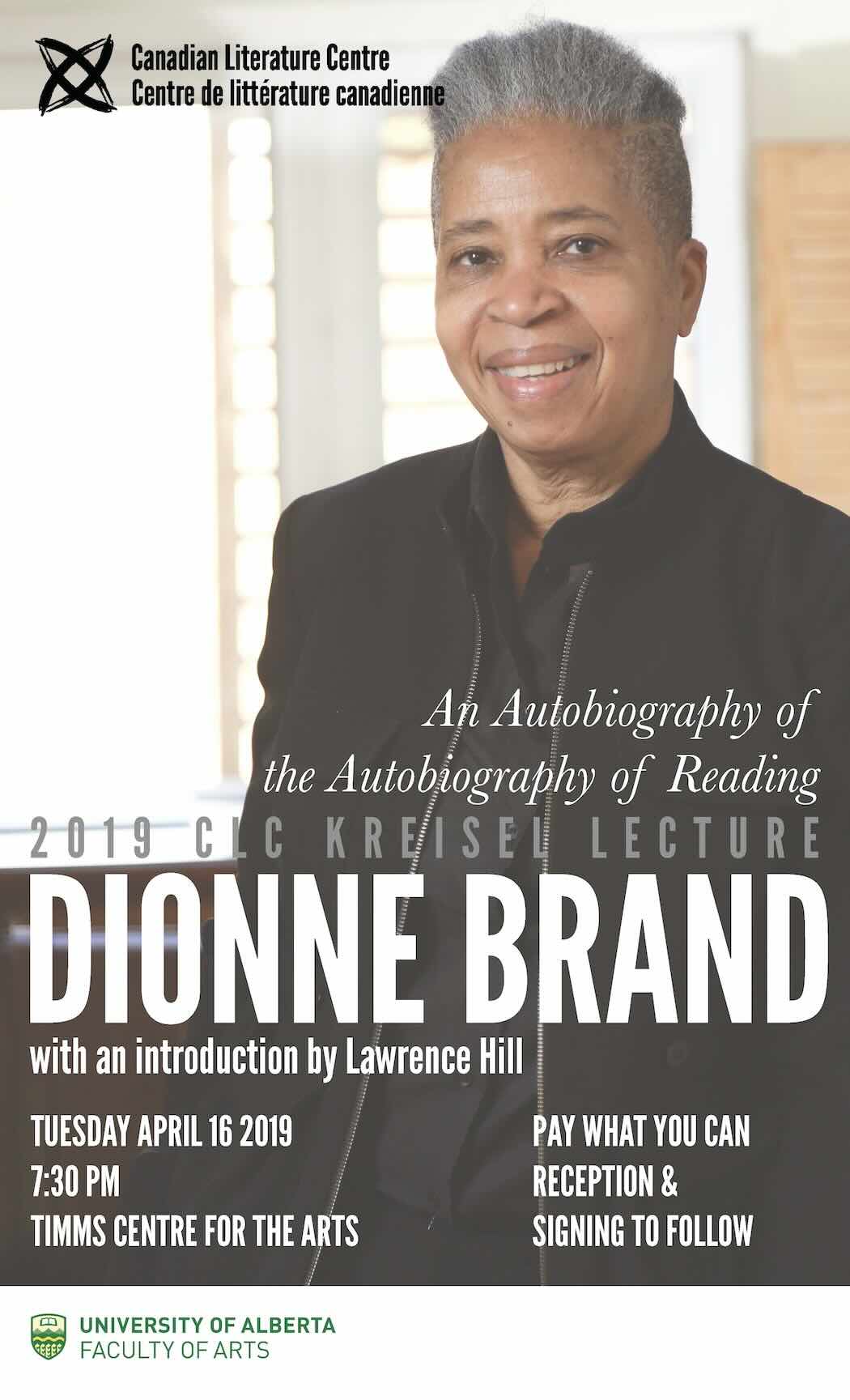
Portrait photo credit: Jason Chow
Author biography that was included in the event program:
Dionne Brand’s literary credentials are legion. Her 2010 book of poetry, Ossuaries, won the Griffin Poetry Prize, and her other accolades include the Governor General’s Literary Award, the Trillium Book Award and the Pat Lowther Memorial Award. Her novel In Another Place, Not Here was selected as a New York Times Book Review Notable Book and a Best Book by the Globe and Mail. At the Full and Change of the Moon was selected a Best Book by the LA Times, and What We All Long For won the Toronto Book Award. In 2006, Brand was awarded the Harbourfront Festival Prize for her contribution to the world of books and writing, and was Toronto’s Poet Laureate from 2009 to 2012. In 2017, she was named to the Order of Canada, and 2018 saw the publication of two new titles: Theory and The Blue Clerk. Brand is a Professor in the School of English and Theatre Studies at the University of Guelph. She lives in Toronto.
2018 Kreisel Lecture with Michael Crummey
"Most of What Follows is True"
On Thursday, April 12, 2018, Michael Crummey presented the 12th annual Kreisel Lecture, held at the TIMMS CENTRE for the ARTS. The lecture, titled "Most of What Follows is True," was preceded by an introduction from Dr. Margaret Mackey, and was followed by a Q & A, reception, and book signing.
Watch the lecture and Q & A on YouTube.
CBC Radio One's IDEAS aired an episode about this lecture on September 7, 2018, which you can read more about on their website.
Lecture Abstract:
The past twenty-five years have witnessed the flowering of a Newfoundland literature that has had a significant presence on the national and international stage. The place and its people have featured in the work of writers such as Annie Proulx, Wayne Johnston, and Lisa Moore, all of whom have been published to acclaim in countries around the world. The emergence of a significant body of fiction in which Newfoundland’s culture and history figures prominently has done much to influence the image of Newfoundland that people from the province and in the outside world “see.” And it has also raised niggling questions about the use of history and real-life figures to animate fictional stories. Is there a limit to the liberties a writer can take with the real world? Is there a point at which a fictionalization of history becomes a falsification of history? What responsibilities do writers have to their readers, and to the historical and cultural materials they exploit as sources?
Using Newfoundland and its recent literature as a case study, and drawing on Michael Crummey’s own experience appropriating historical characters to fictional ends, “Most of What Follows is True” is an examination of the complex relationship between fact and fiction, between the “real world” and the stories we tell to explain the world to ourselves.
This lecture was published with the title Most of What Follows is True: Places Imagined and Real.
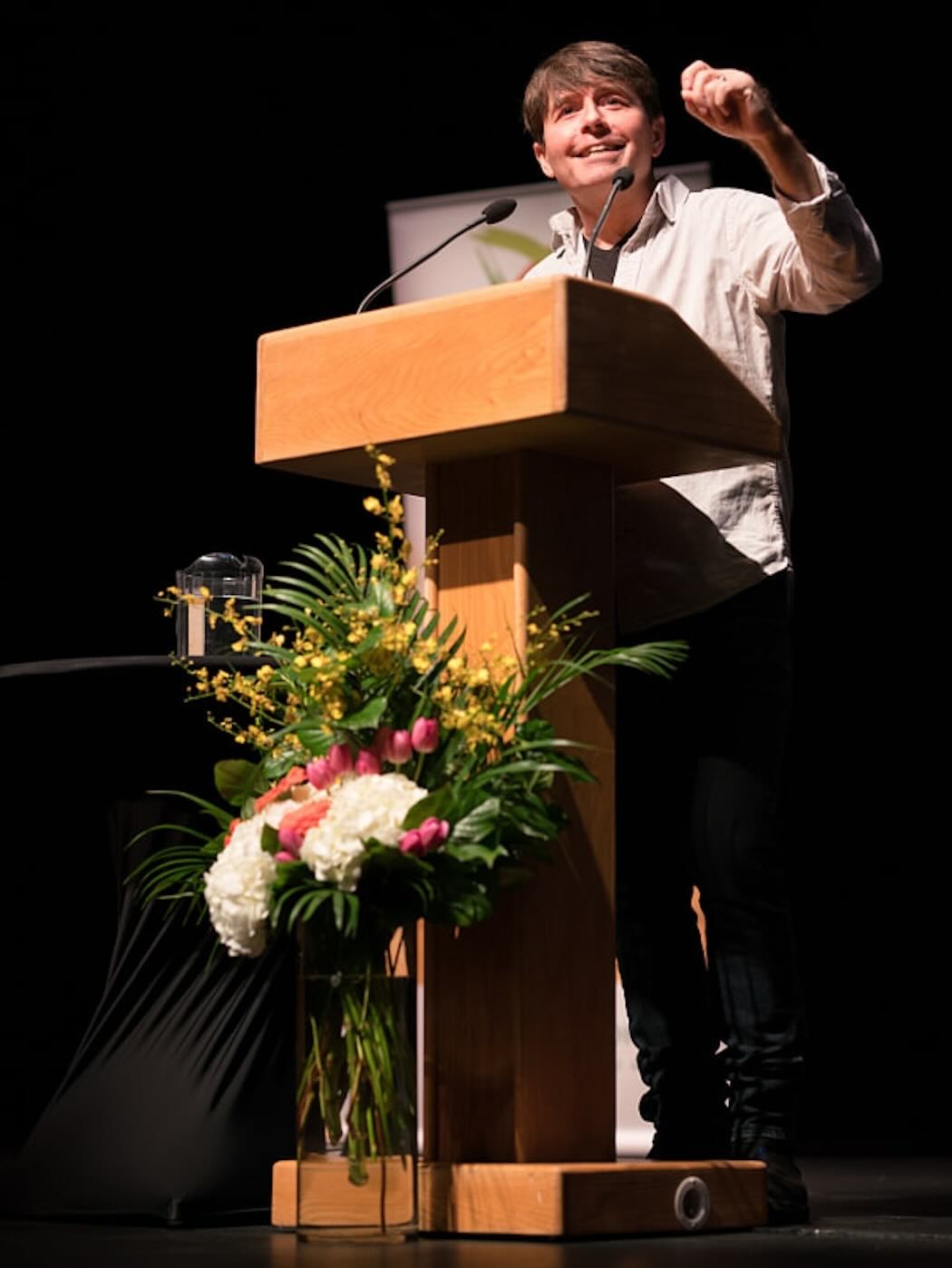
Michael Crummey presenting his lecture.
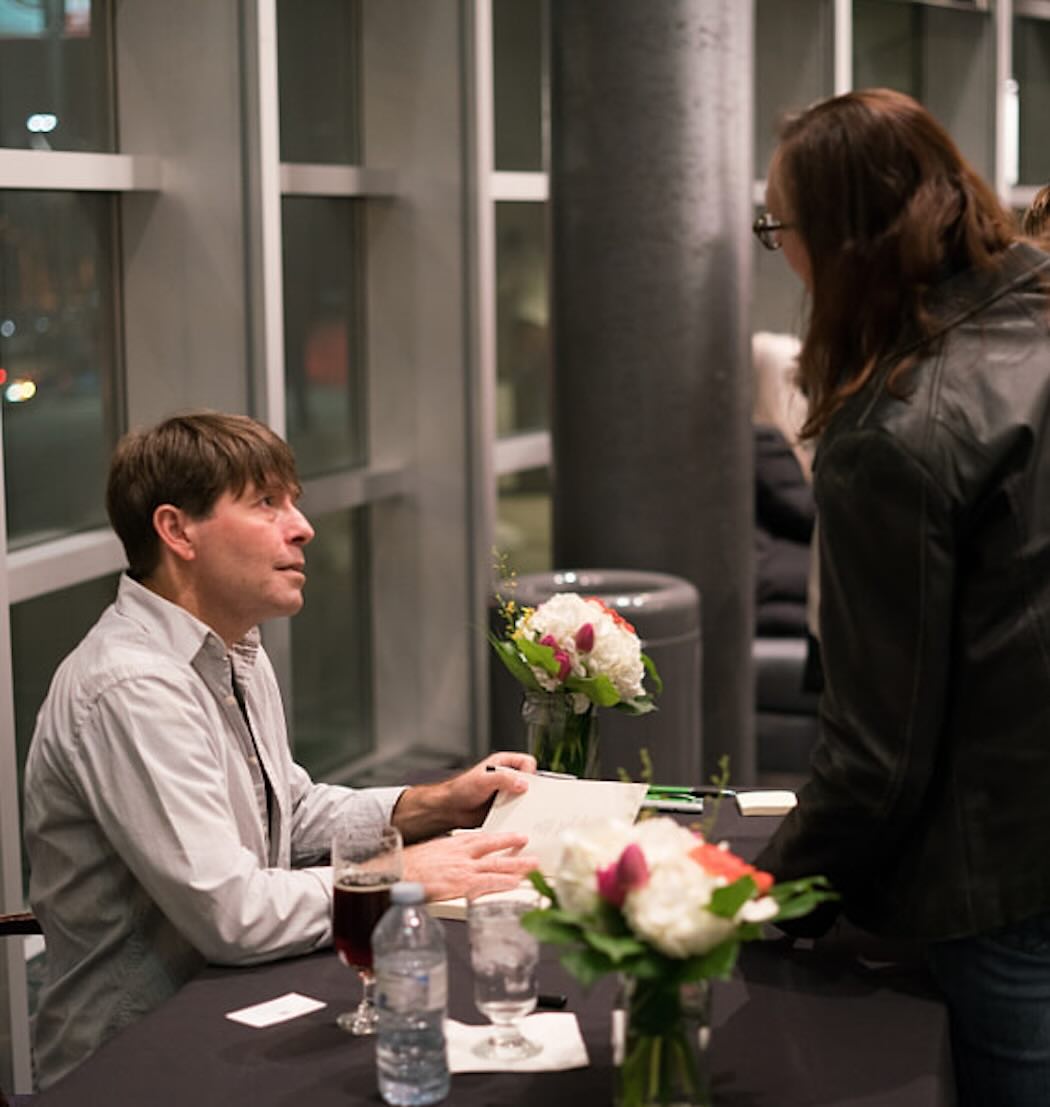
Michael signing books during the reception. Photos credit: Adrien Guyot
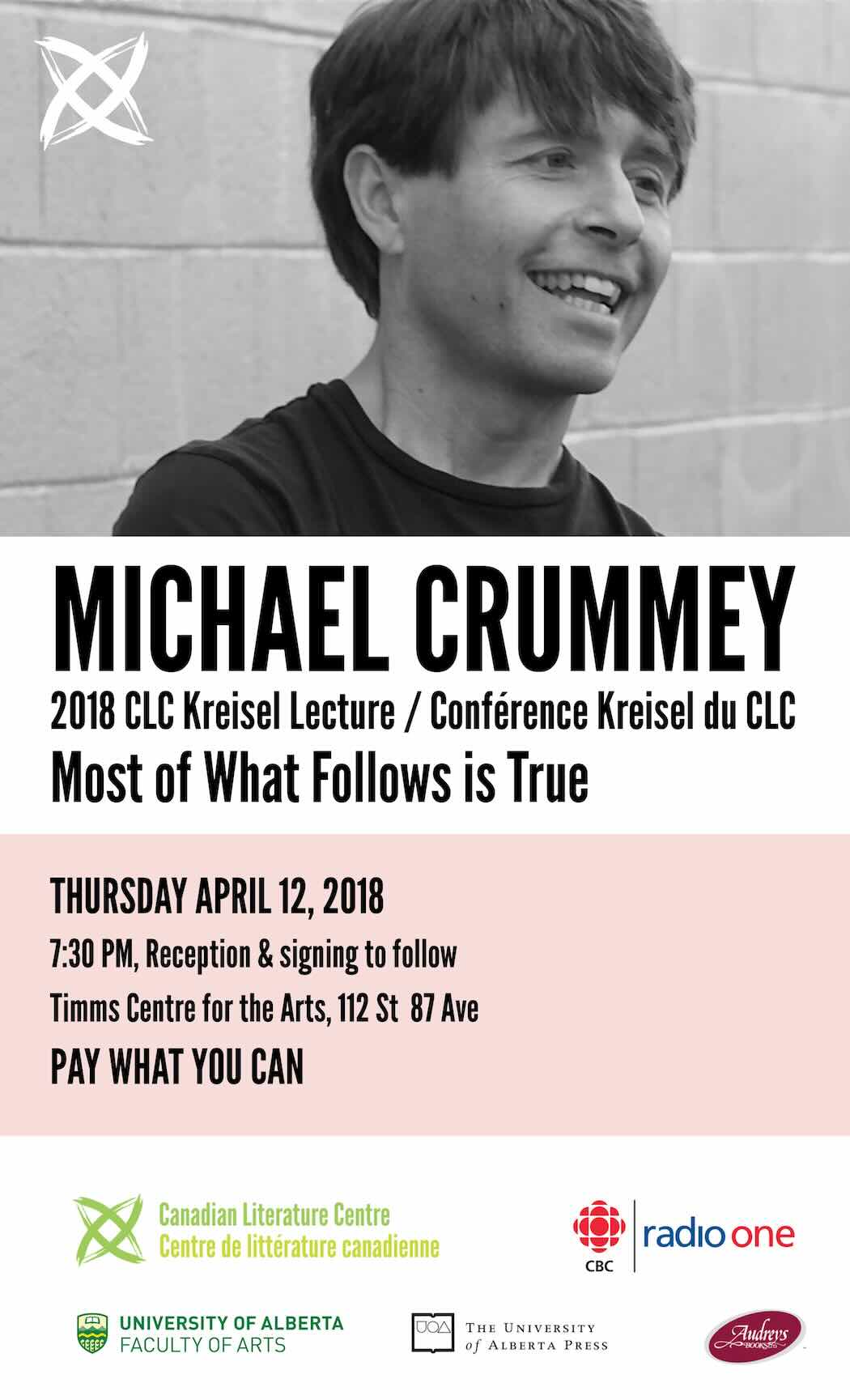
Portrait photo credit: Andrew McCormack
Author biography that was included in the event program:
Michael Crummey is a poet, short story writer and novelist whose writing is largely inspired by the history of Newfoundland and Labrador. He is the author of eight books of poetry, among them Hard Light and Under the Keel, and four novels, including Galore and Sweetland. Crummey's writing has been nominated for the Governor General's Literary Award and the Scotiabank Giller Prize, and has been awarded such prizes as the Timothy Findley Award and the Writers' Trust of Canada Fellowship.
2017 Kreisel Lecture with Heather O'Neill
"My Education. On unusual muses and mentors. And how I had to teach myself everything in order to cross the class divide."
On Thursday, March 9, 2017, Heather O'Neill was the speaker for the 11th annual Kreisel Lecture, held at the TIMMS CENTRE for the ARTS. After an introduction by Dr. Kit Dobson, Heather presented her talk, which she titled "My Education. On unusual muses and mentors. And how I had to teach myself everything in order to cross the class divide." The lecture was followed by a Q & A moderated by Kit, as well as a reception and book signing.
Watch the lecture and Q & A on YouTube.
Lecture Abstract:
I am going to speak about my miseducation by my father, who was a janitor, and his esteemed colleagues, who included ex-bank robbers and homeless men. This education will include lessons about when it is okay to shoplift, the merits of Paul Newman, the value of tuba playing, the joy of burning money while intoxicated, how to eat fondue, what is good literature, how to survive a World War and how to develop a firm belief that you are better than anyone else. These eccentric teachers taught me about the circuitous alleyways of semantics and the depths of moral philosophy with as much erudition as my professors at McGill University later did. Intelligence is a performance of intelligence and children are instructed at a young age how to play parts that will allow them to be accepted in the world as brilliant. Your teacher might be a wonderful caring guardian, or they might be a half-mad concierge with anger issues. Either way, there are rule books to be passed on. I will be positing that ultimately writing is about reclaiming alienated personhood and valuing rule books from idiosyncratic groups as literature. I will be speaking about the joy of adding pages and lore to the instructional manuals of one's youth. And, finally, I will be touching on why sadness and heartbreak is the funniest thing in the whole wide world.
This lecture was published with the title Wisdom in Nonsense: Invaluable Lessons from My Father.
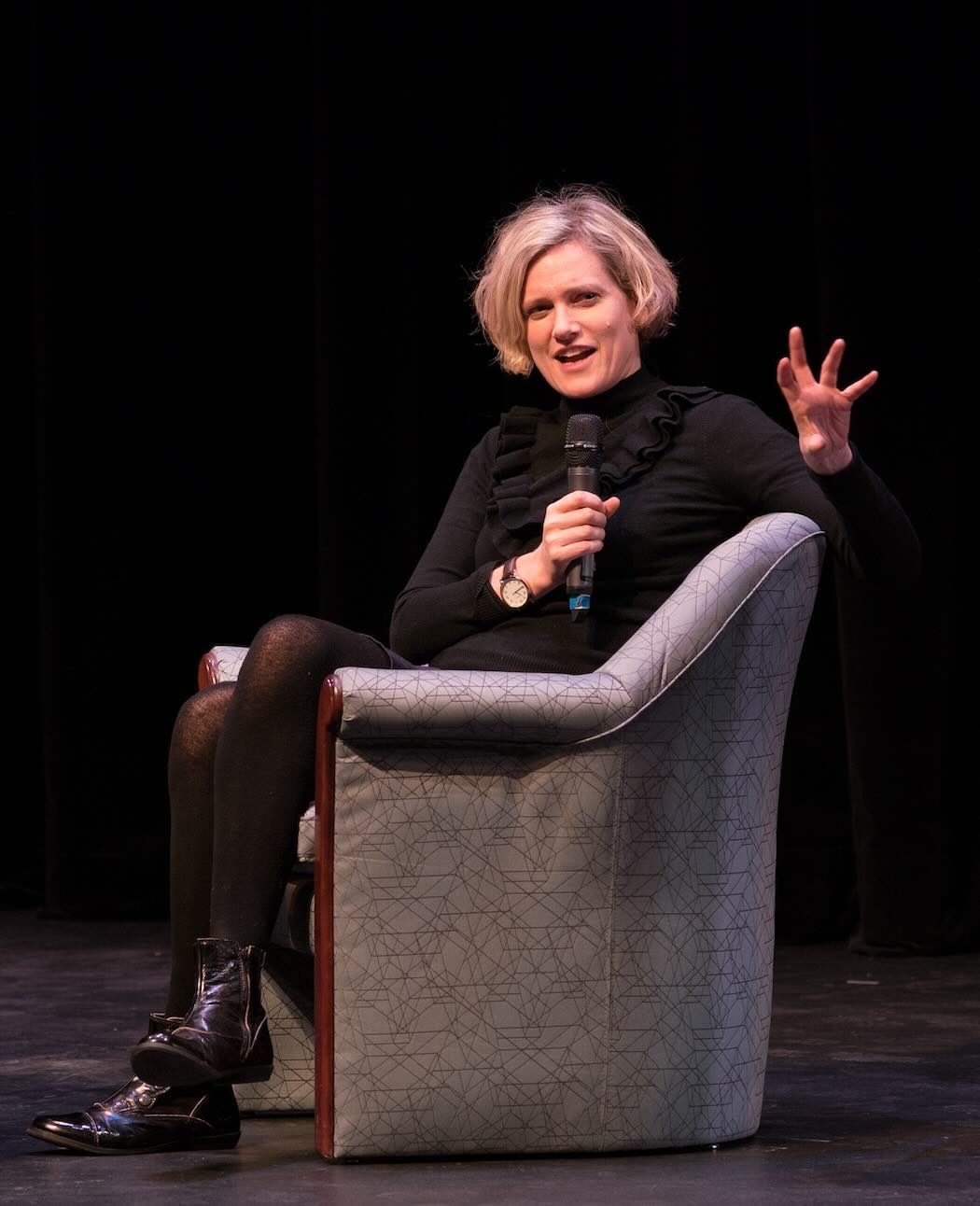
Heather O'Neill answering audience questions following her Kreisel Lecture.
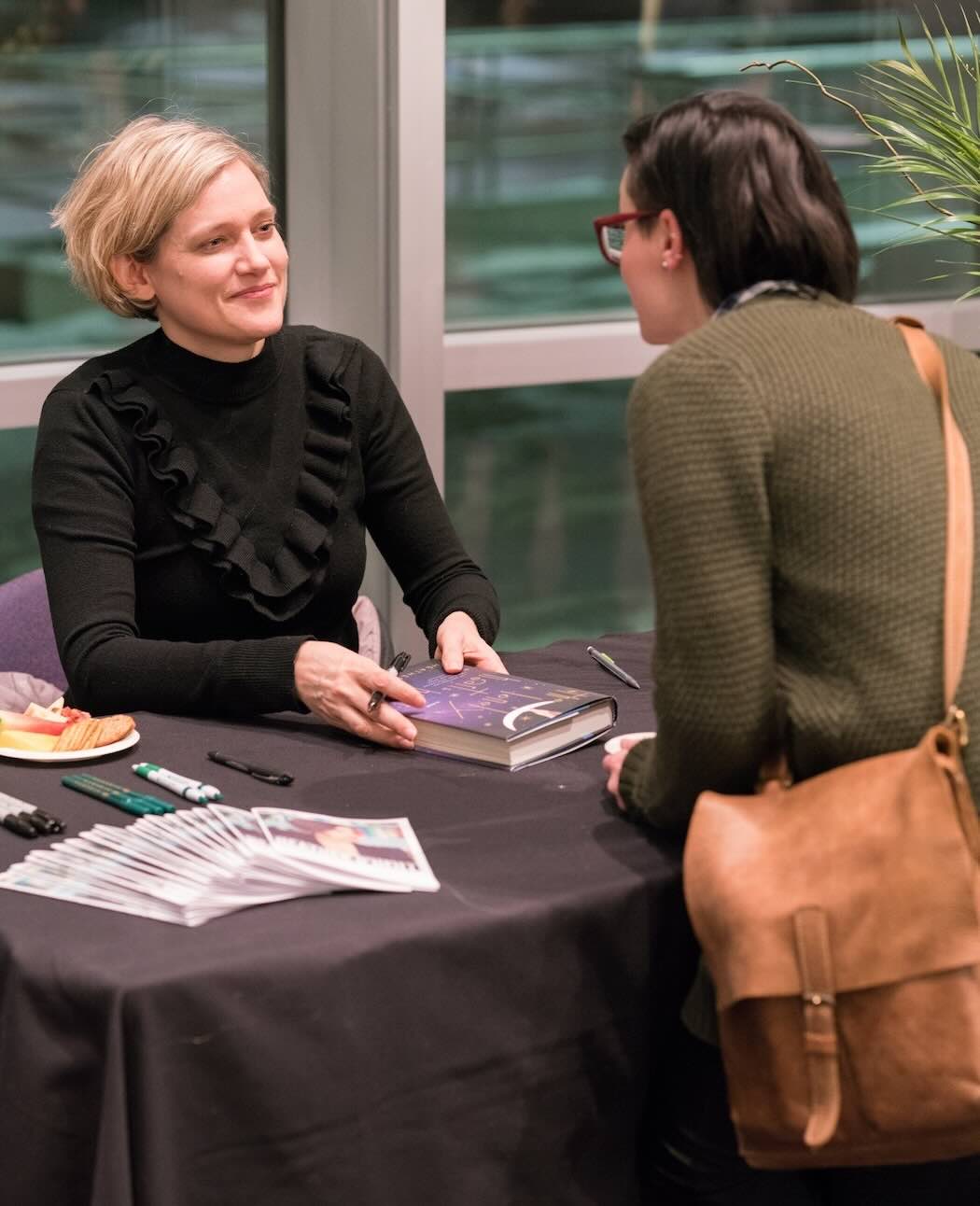
Heather signing books during the reception. Photos credit: Adrien Guyot
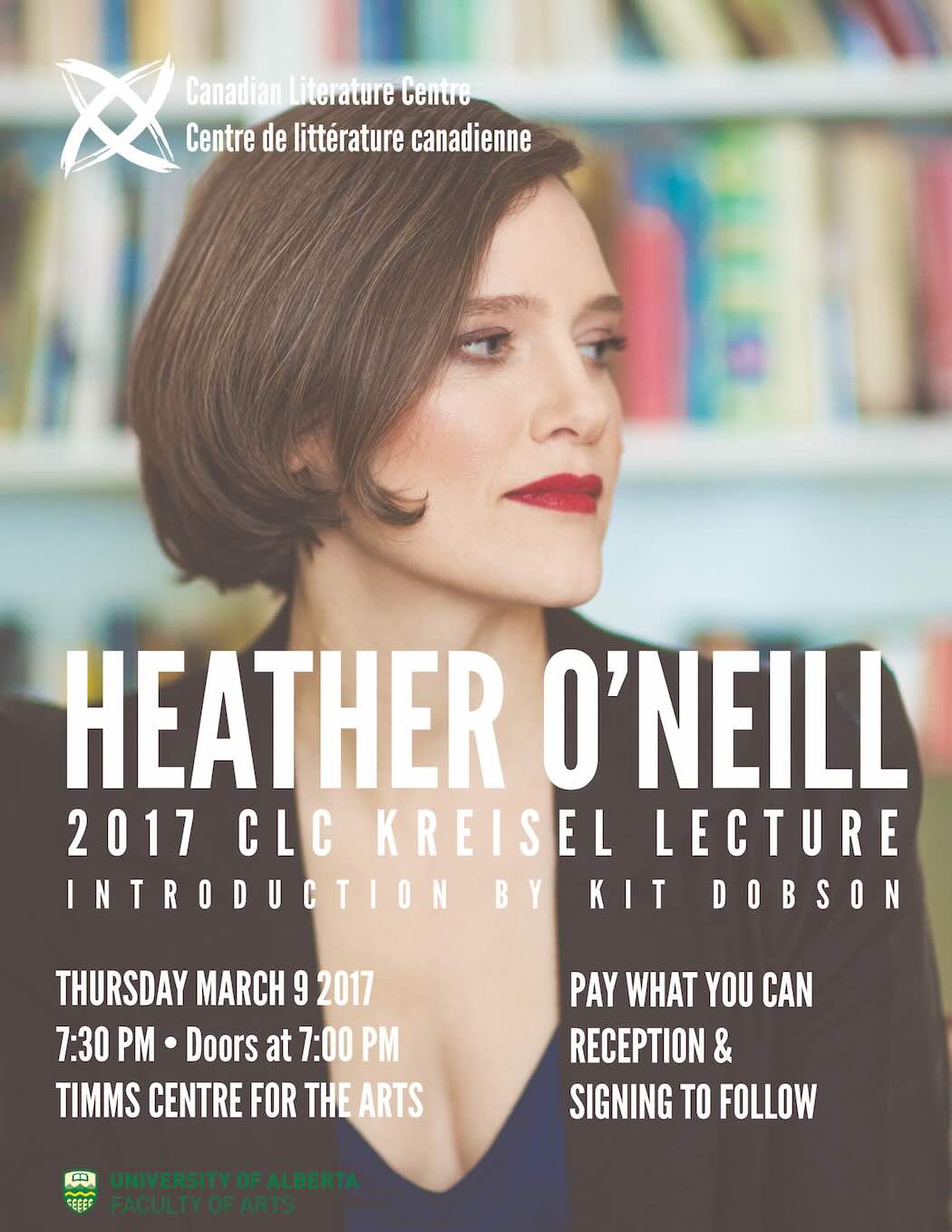
Portrait photo credit: Julia C. Vona, Juno Photo
Author biography that was included in the event program:
Heather O'Neill is a Canadian novelist, poet, short-story writer, screenwriter and essayist. Lullabies for Little Criminals, her debut novel, was published in 2006 to international critical acclaim and won Canada Reads. It was shortlisted for both the Governor General's Award for Fiction and the Orange Prize for Fiction. She has since published the novel The Girl Who Was Saturday Night and the short story collection Daydreams of Angels, both of which were shortlisted for the Scotiabank Giller Prize in consecutive years. The collection was also shortlisted for the Paragraphe Hugh MacLennan Prize for Fiction. Her most recent novel, The Lonely Hearts Hotel, was published in February 2017. Born and raised in Montreal, O'Neill lives there today with her daughter.